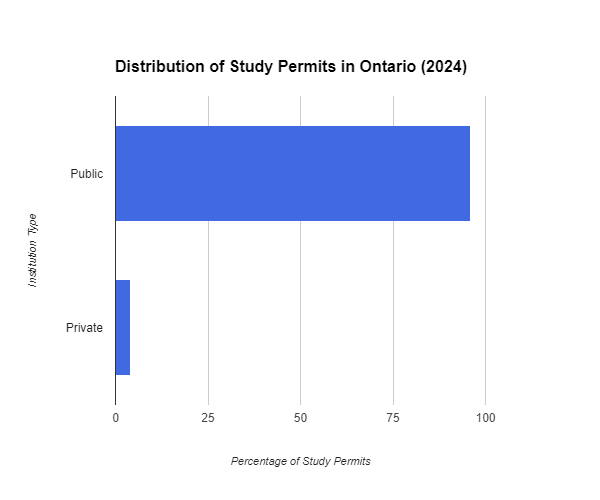Are you thinking about studying in Ontario, Canada? Great choice! The IRCC said that of the more than one million study permit holders – who include school, college and university students and those pursuing other studies – 526,015 were in Ontario, 202,565 were in British Columbia, and 117,925 were in Quebec. Only ten (10) international students were studying in Nunavut and 18,695 in Saskatchewan. Read more. In recent news, 96% of Ontario’s study permits will go to public universities and colleges in 2024. This change may affect your study permit application, especially if you are considering a private college or language school. Here is a breakdown of the new policy and how it might impact Nigerian students like you:
Update: Public Universities and Colleges Take Priority
The Ontario government announced a new plan for allocating study permits. The key takeaway is that public colleges and universities will receive 96% of Ontario’s study permits applications. What this means is that fewer spots are available for private institutions.
- The allocation of study permits to institutions cannot exceed the permits issued in 2023. Also, the ratio of international study permits cannot exceed 55% (exclusive of high-demand areas) of the institutions in 2023 first-year domestic enrolment.
- All public Ontario universities other than Algoma University in Sault Ste. Marie—which will see a decline from the intake levels in 2023— will keep applications at the 2023 level.
- 11 out of the 24 public colleges will also maintain their applications at the 2023 level. Among colleges with public-private partnerships, such as Conestoga College, the volume of applications is expected to decrease significantly.

Why the Change?
The press release comes in response to a decision from IRCC earlier this year to cap the number of study permits issued to international students across Canada in 2024 and 2025.
This measure from IRCC is for international students at the undergraduate level. The cap excludes international students at the primary and secondary school level and students pursuing Masters and doctoral degrees.
The Ontario provincial government has chosen to allocate study permits for international students by prioritizing programs in several high-demand areas:
- Skilled trades
- Health human resources
- Science, Technology, Engineering and Mathematics
- Hospitality
- Childcare
Ontario also specified that it will prioritize French-language enrolment. It is essential because employers compete for workers with French language skills.
Boost Your Chances: Programs & French
So, how can you increase your chances of getting one of the 96% of Ontario’s study permits?
- Choose a high-demand program: Research programs that align with Ontario’s labour market needs to make your application more competitive.
- French language: The government prioritizes international students with French language skills. Learning some French could be an advantage!
Ontario’s Study permit allocations compare to other provinces?
The proportion of study permits allocated to public institutions in Ontario is higher than in other provinces. For example, British Columbia (the province with the second most Designated Learning Institutions (DLIs) after Ontario) split its allocation roughly evenly between public post-secondary institutions (53%) and private institutions (47%). British Columbia’s Ministry of Post-Secondary Education and Future Skills confirmed the province will be allocated 83,000 undergraduate study permit applications for 2024.
Ontario has not yet announced the total number of study permit applications that it has been given from the federal government this year. Guidelines provided by IRCC suggest that the province will have the largest quota for study permits of any province or territory based on its population size.
1-Year Masters in Canada: All You Need to Know
Next Steps for Provincial Attestation Letter (PAL)
We are still waiting for details on the application process. The Ontario government will release information on obtaining a provincial attestation letter (PAL), a required document for your study permit application. International students who wish to study in Ontario are to contact their school of choice directly for information on the required documents. According to the Ontario College Application Service (OCAS)—the centralized application service for colleges in Ontario—international students will not have to apply for PALs directly. The school can request on your behalf to the Ontario Ministry of Colleges and Universities, saving you time and ensuring a well-prepared application. Once the application is approved and the PAL is ready, international students will receive a copy of their letter from their DLI.
Conclusion
In conclusion, Ontario’s new policy for allocating study permits will impact international students applying to private institutions. With public universities and colleges taking priority, the competition for available spots will be higher than it was. However, as the application process for PAL and allocation of study permits for 2024 are still being finalized, it is crucial to stay informed and in touch with your school of choice for the latest updates.



One Comment